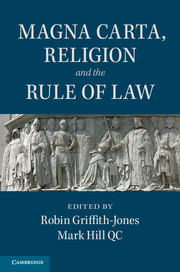Book contents
- Frontmatter
- Contents
- List of contributors
- Preface and acknowledgments
- I Introduction
- II The birth of Magna Carta and the spread of its principles
- III Comparative religious approaches to Magna Carta's rule of law
- IV The contemporary inheritance of Magna Carta
- 15 The development of human rights thought from Magna Carta to the Universal Declaration of Human Rights
- 16 Strasbourg's approach to religion in the pluralist democracies of Europe
- 17 The Great Covenant of Liberties: biblical principles and Magna Carta
- 18 The cardinal rule of religion and the rule of law: a musing on Magna Carta
- 19 Strengthened by the rule of law: the message of Magna Carta for religions today
- Appendix The Charters in translation
- Bibliography
- Index
15 - The development of human rights thought from Magna Carta to the Universal Declaration of Human Rights
from IV - The contemporary inheritance of Magna Carta
Published online by Cambridge University Press: 05 May 2015
- Frontmatter
- Contents
- List of contributors
- Preface and acknowledgments
- I Introduction
- II The birth of Magna Carta and the spread of its principles
- III Comparative religious approaches to Magna Carta's rule of law
- IV The contemporary inheritance of Magna Carta
- 15 The development of human rights thought from Magna Carta to the Universal Declaration of Human Rights
- 16 Strasbourg's approach to religion in the pluralist democracies of Europe
- 17 The Great Covenant of Liberties: biblical principles and Magna Carta
- 18 The cardinal rule of religion and the rule of law: a musing on Magna Carta
- 19 Strengthened by the rule of law: the message of Magna Carta for religions today
- Appendix The Charters in translation
- Bibliography
- Index
Summary
In the opening section of this chapter, I trace the development of human rights thought from the time of Magna Carta to the Universal Declaration of Human Rights of 1948. In the second part, I proceed to discuss the relationship between that development and religious thought. When I visited Runnymede some years ago, I bought a souvenir postcard which reminded me that it is regarded as the ‘birthplace of democracy’. This may be bad history but, as Professor Linda Colley has observed, there is a ‘cult and mode of memory’ which rests on bad history and which includes Magna Carta as the most important text in stories of liberty. On reflection I would suggest that there are three fundamental ideas which can be traced back, at least so far as the United Kingdom is concerned, to the drafting of what later became known as the Great Charter in June 1215. They are three related ideas but are in fact distinct.
First is the idea that even the king was subject to the law. This is what has evolved into the concept of the rule of law, a concept which was so elegantly and comprehensively analysed by the late Lord Bingham in his Sir David Williams lecture on that subject in 2006 and his later book with that title in 2010. At the heart of this concept is the idea that the government itself, and not only those who are governed by it, is subject to the law. As is well known, the symbolic importance of Magna Carta has always been greater than the precise provisions it actually contained. It has been argued about and reinterpreted ever since. As Professor Elizabeth Wicks has explained in her account of key moments in British constitutional history: ‘Even though it originated as merely an attempt to protect baronial interests, by establishing the principles inherent in the Rule of Law, the Magna Carta left a legacy for individuals of future ages to ensure that their governments acted according to the law and legal processes.’
- Type
- Chapter
- Information
- Magna Carta, Religion and the Rule of Law , pp. 267 - 280Publisher: Cambridge University PressPrint publication year: 2015



